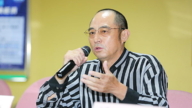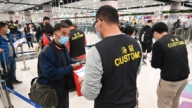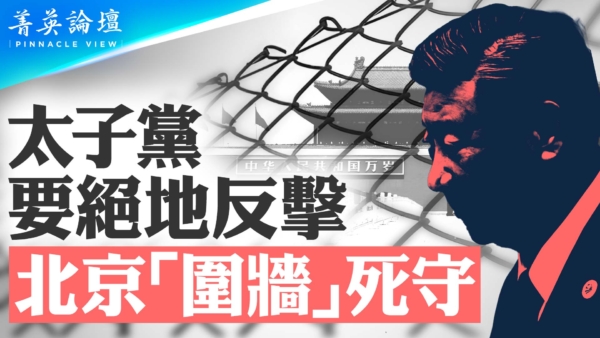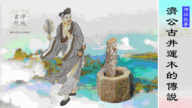【新唐人2014年11月11日讯】中日关系因钓鱼岛主权问题一直徘徊在历史低点,就在外界纷纷猜测中日领导人能否在APEC峰会期间会面的时候,北京忽然传来两国首脑正式会晤的消息,引发了各界关注。尤其是习近平在会见安倍时的异常表情,更是令舆论揣测中日双方的关系是否能够真的“破冰”。
据《新华社》报导,11月10号早间,中共国家主席习近平和日本首相安倍晋三在北京人民大会堂开始了正式会谈,并在会晤结束后召开了记者发布会。这是3年来中日首次首脑峰会,也是双方各自成为自己国家最高领导人后,首次在公开场合正式会晤。
尽管这次会谈在外界看来是中日关系破冰的一丝曙光,但也有声音认为中方似乎并不情愿——英国广播公司《BBC》在报导指出,从中共央视播放的电视画面可以看出,习近平在会晤安倍时,面部表情生硬严肃,没有露出任何笑容。
《BBC》说,经过两年的敌视后,习近平终于对安倍晋三作出让步,促成了这次会面。《新华社》则形容称,这次会谈是习近平“应约”参加的。
不过,《BBC》在另外一篇报导中,引述中国上海社会科学院亚太研究所研究员刘鸣的话说,这个会谈基本上还是形式上的一个会谈,双方是在被迫的情况下演出了这场政治秀。
此前因为中日关系降到冰点,甚至一度处于爆发公开冲突的边缘 ,外界对于双方会面能否达成多抱有怀疑和观望态度。尤其中共官媒《环球时报》引述接近中方消息人士称,中共外交部长王毅和日本外相岸田文雄的会谈“并不十分理想和愉快”。 令外界对于两国关系缓和更加不看好。
对此,多家外媒曾分析,即使中日双方会面可能显示了缓解僵局的意愿,但也是短暂而不具实质意义的。除非有一方愿意就钓鱼岛主权等问题,做出真正让步。
上海复旦大学日本研究中心冯炜教授表示,他曾与一位有着日本政府背景的日本学者在交谈中了解到,日本曾经试图在钓鱼岛问题上作出让步,但双方最终没能达成一致。
上海复旦大学日本研究中心冯炜教授:“他说曾经有一次,就出现这样的情况,就是日方提出中方停止钓鱼岛海域巡航的话,日本可以考虑承认存在争议。那么中方的态度是你承认争议,我就停止巡航。也就是说这变成先有鸡还是现有蛋的问题。”
有分析指出,此次的中日首脑能够成功会晤,虽然可能与日方就钓鱼岛问题的暂时让步,以及四项原则共识的达成有关,但最关键的还是中共急于打破与多个国家间的外交僵局,尤其恰逢APEC聚会,更为中共当局提供了一个绝好的“顺水推舟”的机会。
冯炜:“坦率地说,中国现在要缓和周边的局势,现在也是很紧迫的任务。和日本继续这样对抗下去的话,对日本不利,对中国也不利,其实双方都很清楚。”
据《BBC》报导,安倍在会谈后表示,此次会谈是“日中两国重返战略互惠关系的原点,也是改善关系的第一步”,他也在会中向习近平建议,尽早建立海上紧急联络机制,并称两国为此“将展开具体工作”。
冯炜:“随着这次四项原则共识的达成,就要花时间解决这些问题,我相信只要彼此不进入双方海域,不登岛,我想应该是目前双方会采取的基本办法。”
台湾国立政治大学国际关系研究中心研究员蔡增家,刊发评论文章表示,中日两国对这四点共识的各自表述、各说各话,也凸显出中日两国之间政治信任基础的薄弱。“习安会”如果不能对两国的历史问题、领土争议等问题开诚布公的沟通,那么四点共识将不会是中日关系重新开展的起点,而会是中日对话的终点。
采访/秦雪 编辑/张天宇 后制/葛雷
China and Japan Conduct Icy Talks at APEC.
The Chinese Communist Party (CCP) has been at its historical
low point in the relationship with Japan.
This is due to the sovereignty dispute of the Diaoyu Islands.
The two countries finally met during the APEC summit in
Beijing watched by the world.
Xi Jinping’s icy expression in the press conference has people
doubting if the two countries have really “broken" the ice.
Xinhua News Agency reported on Nov. 10 that Chinese
President Xi Jinping had a formal meeting with Japanese
Prime Minister Shinzo Abe in Beijing’s Great Hall. A
briefing was held after the talk.
This is the first official meeting between the two leaders
in three years since they took up their offices.
Although the talks seemed to bring hope to the relationship
between the two countries, the BBC reported that, Xi’s body
language at the meeting was calculatedly icy. During the
handshake he did not smile.
The BBC reported, after two years of Chinese animosity to
Japan’s new prime minister, President Xi finally relented.
Xinhua described the meeting was Xi Jinping’s response
to the invitation.
BBC Chinese report quoted Liu Ming, at the Institute of
International Relations, Shanghai Academy of Social
Sciences, saying the talks is basically involuntary, a
form of political show.
The China-Japan relations are down to the verge
of open confrontation.
Many have doubted the possibility of a meeting
between the two sides.
The easing of relations seemed even less promising
after a report from Global Times.
It described the talks between Chinese Foreign Minister
Wang Yi and Japanese Foreign Minister Fumio Kishida
as “not exactly satisfactory or enjoyable" as quoted by
sources close to the Chinese side.
A number of foreign media have analyzed, even though
the meeting may show both countries’ willingness to ease
the deadlock, but it was short and impractical, unless one is
willing to yield on the sovereignty issue over the Diaoyu Islands.
Professor Feng Wei, Center for Japanese Studies, Fudan
University, said Japan has tried to yield on the territory issue.
However they have failed to reach an agreement, according
to his conversation with a Japanese scholar who has a
government background.
Professor Feng Wei: “He said Japan has proposed that
if China stops cruising around the Diaoyu Islands, Japan
will consider recognizing the dispute.
But, the CCP insisted that if Japan recognizes the dispute,
China will stop cruising around.
It became a question of chicken first or egg first."
Some analysts pointed out that the temporary concession
on Japan’s side could have prompted the meeting.
The principles and spirit of the four political documents
between the two countries could also have contributed
to the meeting.
However, mostly likely it is the CCP who is eager to break
the diplomatic impasse with a number of countries.
APEC has provided a grand opportunity for the CCP.
Feng Wei: “Frankly, it is China’s urgent task to ease
its diplomatic tension with surrounding countries.
The opposing situation is bad for Japan and for China.
Both sides are clear about it."
Abe said the meeting was “the first step for improving ties
by returning to mutually beneficial relations based on
common strategic interests".
He said they had agreed to start preparations to establish
a maritime crisis mechanism, reported the BBC.
Feng Wei: “With the consensus of the four principles,
these issues will take time to resolve.
I believe both sides will take the approach of not entering
the waters and not landing on the islands."
Zheng-Jia Tsai, researcher, Institute of International Relations,
National Chengchi University, has commented in his article.
He stated that China and Japan, have different definitions
of the four principles.
These reflect the lack of political trust
between the two countries.
For lack of an honest communication over the historical
territory disputes in the meeting, the four principles,
rather than beginning a new development for the two
countries, will become the end of the dialogue.
Interview/QinXue Edit/Zhang Tianyu Post-Production/GeLei






























